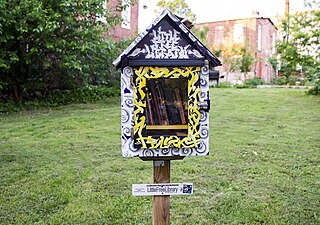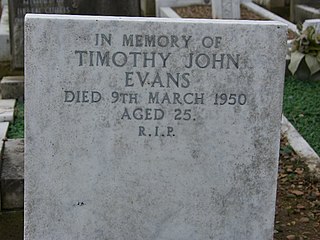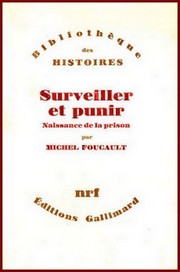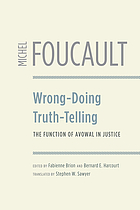Post-structuralism is a philosophical movement that questions the objectivity or stability of the various interpretive structures that are posited by structuralism and considers them to be constituted by broader systems of power. Although post-structuralists all present different critiques of structuralism, common themes among them include the rejection of the self-sufficiency of structuralism, as well as an interrogation of the binary oppositions that constitute its structures. Accordingly, post-structuralism discards the idea of interpreting media within pre-established, socially constructed structures.

Discourse is a generalization of the notion of a conversation to any form of communication. Discourse is a major topic in social theory, with work spanning fields such as sociology, anthropology, continental philosophy, and discourse analysis. Following pioneering work by Michel Foucault, these fields view discourse as a system of thought, knowledge, or communication that constructs our experience of the world. Since control of discourse amounts to control of how the world is perceived, social theory often studies discourse as a window into power. Within theoretical linguistics, discourse is understood more narrowly as linguistic information exchange and was one of the major motivations for the framework of dynamic semantics, in which expressions' denotations are equated with their ability to update a discourse context.

Paul-Michel Foucault was a French philosopher, historian of ideas, writer, political activist, and literary critic. Foucault's theories primarily address the relationships between power and knowledge, and how they are used as a form of social control through societal institutions. Though often cited as a structuralist and postmodernist, Foucault rejected these labels. His thought has influenced academics, especially those working in communication studies, anthropology, psychology, sociology, criminology, cultural studies, literary theory, feminism, Marxism and critical theory.

The sociology of knowledge is the study of the relationship between human thought, the social context within which it arises, and the effects that prevailing ideas have on societies. It is not a specialized area of sociology. Instead, it deals with broad fundamental questions about the extent and limits of social influences on individuals' lives and the social-cultural basis of our knowledge about the world. The sociology of knowledge has a subclass and a complement. Its subclass is sociology of scientific knowledge. Its complement is the sociology of ignorance.
Immorality is the violation of moral laws, norms or standards. It refers to an agent doing or thinking something they know or believe to be wrong. Immorality is normally applied to people or actions, or in a broader sense, it can be applied to groups or corporate bodies, and works of art.
The concept of a carceral archipelago was first used by the French historian and philosopher Michel Foucault in his 1975 publication, Surveiller et Punir, to describe the modern penal system of the 1970s, embodied by the well-known penal institution at Mettray in France. The phrase combines the adjective "carceral", which means that which is related to jail or prison, with archipelago—a group of islands. Foucault referred to the "island" units of the "archipelago" as a metaphor for the mechanisms, technologies, knowledge systems and networks related to a carceral continuum. The 1973 English publication of the book by Solzhenitsyn called The Gulag Archipelago referred to the forced labor camps and prisons that composed the sprawling carceral network of the Soviet Gulag.

The History of Sexuality is a four-volume study of sexuality in the Western world by the French historian and philosopher Michel Foucault, in which the author examines the emergence of "sexuality" as a discursive object and separate sphere of life and argues that the notion that every individual has a sexuality is a relatively recent development in Western societies. The first volume, The Will to Knowledge, was first published in 1976; an English translation appeared in 1978. The Use of Pleasure, and The Care of the Self, were published in 1984. The fourth volume, Confessions of the Flesh, was published posthumously in 2018.
A lie-to-children is a simplified, and often technically incorrect, explanation of technical or complex subjects employed as a teaching method. Educators who employ lies-to-children do not intend to deceive, but instead seek to 'meet the child/pupil/student where they are', in order to facilitate initial comprehension, which they build upon over time as the learner's intellectual capacity expands. The technique has been incorporated by academics within the fields of biology, evolution, bioinformatics and the social sciences.
In philosophy, episteme is knowledge or understanding. The term epistemology is derived from episteme.
Governmentality is a concept first developed by the French philosopher Michel Foucault in the later years of his life, roughly between 1977 and his death in 1984, particularly in his lectures at the Collège de France during this time.

A miscarriage of justice occurs when an unfair outcome occurs in a criminal or civil proceeding, such as the conviction and punishment of a person for a crime they did not commit. Miscarriages are also known as wrongful convictions. Innocent people have sometimes ended up in prison for years before their conviction has eventually been overturned. They may be exonerated if new evidence comes to light or it is determined that the police or prosecutor committed some kind of misconduct at the original trial. In some jurisdictions this leads to the payment of compensation.

Discipline and Punish: The Birth of the Prison is a 1975 book by French philosopher Michel Foucault. It is an analysis of the social and theoretical mechanisms behind the changes that occurred in Western penal systems during the modern age based on historical documents from France. Foucault argues that prison did not become the principal form of punishment just because of the humanitarian concerns of reformists. He traces the cultural shifts that led to the predominance of prison via the body and power. Prison is used by the "disciplines" – new technological powers that can also be found, according to Foucault, in places such as schools, hospitals, and military barracks.
Biopower is a term which relates to the practice of modern nation states and their regulation of their subjects through "an explosion of numerous and diverse techniques for achieving the subjugations of bodies and the control of populations". It was coined by French social theorist Michel Foucault. Foucault first used the term in his lecture courses at the Collège de France, and the term first appeared in print in The Will to Knowledge, Foucault's first volume of The History of Sexuality. In Foucault's work, it has been used to refer to practices of public health, regulation of heredity, and risk regulation, among many other regulatory mechanisms often linked less directly with literal physical health. It is closely related to a term he uses much less frequently, but which subsequent thinkers have taken up independently, biopolitics, which aligns more closely with the examination of the strategies and mechanisms through which human life processes are managed under regimes of authority over knowledge, power, and the processes of subjectivation.
Biopolitics is a concept introduced by the French philosopher Michel Foucault in the mid-20th century, which explores the intricate relationship between politics. At its core, biopolitics explores how governmental power operates through the management and regulation of a population's bodies and lives.
In rhetoric, parrhesia is candid speech, speaking freely. It implies not only freedom of speech, but the obligation to speak the truth for the common good, even at personal risk.

Bernard E. Harcourt is an American critical theorist with a specialization in the area of punishment, surveillance, legal and political theory, and political economy. He also does pro-bono legal work on human rights issues.
Foucauldian discourse analysis is a form of discourse analysis, focusing on power relationships in society as expressed through language and practices, and based on the theories of Michel Foucault.

Moral intellectualism or ethical intellectualism is a view in meta-ethics according to which genuine moral knowledge must take the form of arriving at discursive moral judgements about what one should do. One way of understanding this is that doing what is right is a reflection of what any being knows is right. However, it can also be interpreted as the understanding that a rationally consistent worldview and theoretical way of life, as exemplified by Socrates, is superior to the life devoted to a moral life.

Right to truth is the right, in the case of grave violations of human rights, for the victims and their families or societies to have access to the truth of what happened. The right to truth is closely related to, but distinct from, the state obligation to investigate and prosecute serious state violations of human rights. Right to truth is a form of victims' rights; it is especially relevant to transitional justice in dealing with past abuses of human rights. In 2006, Yasmin Naqvi concluded that the right to truth "stands somewhere on the threshold of a legal norm and a narrative device ... somewhere above a good argument and somewhere below a clear legal rule".

Penitentiaries, Reformatories, and Chain Gangs: Social Theory and the History of Punishment in Nineteenth-Century America is a non-fiction book written by Mark Colvin. It was published by St. Martin's Press in 1997. In this book, Colvin applies theoretical perspectives to changes in punishment that occurred in the United States penal system during the 19th century.










